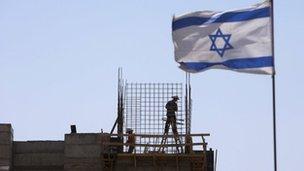Talks over Church of Scotland report on Israel
- Published

The report was critical of settlement expansion
The Church of Scotland has held "useful" discussions with the Jewish community over a controversial report which questioned the divine right of Jews to the land of Israel.
The 10-page discussion paper will be debated and voted on at the Kirk's general assembly later this month.
Israel's ambassador to the UK has described it as "truly hurtful".
A spokeswoman for the Kirk stressed it was not denying Israel's right to exist.
But she accepted the 10-page discussion paper, entitled The Inheritance of Abraham? A report on the Promised Land, external, "has given cause for concern and misunderstanding of its position".
A new introduction to set the context for the report and give clarity about some of the language used was required, she added.
The spokeswoman said: "The concern of the Church about injustices faced by the Palestinian people in the Occupied Palestinian Territories remain firm but that concern should not be misunderstood as questioning the right of the State of Israel to exist.
"Sitting round the table and listening to each other more deeply has created a real opportunity for both communities to better understand each other and that this report now becomes a catalyst for continued and growing conversation.
"The two communities have agreed to work together both here and in Israel and the Occupied Palestinian Territories to continue what was a very positive dialogue."
The talks were held between representatives of the Kirk and Jewish groups including the Scottish Council of Jewish Communities and the Board of Deputies of British Jews.
The report, which was compiled by the Kirk's church and society council, stated there has been a widespread assumption by many Christians, as well as many Jewish people, that the Bible "supports an essentially Jewish state of Israel".
But its authors said an "increasing number of difficulties and current Israeli policies regarding the Palestinians" had led to this viewpoint being questioned.
They wrote: "Possession of any land is clearly conditional. The question that arises is this: Would the Jewish people today have a fairer claim to the land if they dealt justly with the Palestinians?"
Biblical promises about the land of Israel were never intended to be taken literally, or as applying to a defined geographical territory, the report argued.
Instead, it said: "They are a way of speaking about how to live under God so that justice and peace reign, the weak and poor are protected, the stranger is included, and all have a share in the community and a contribution to make to it.
"The 'promised land' in the Bible is not a place, so much as a metaphor of how things ought to be among the people of God. This 'promised land' can be found - or built - anywhere.
"The desire of many in the state of Israel to acquire the land of Palestine for the Jewish people is wrong. The fact that the land is currently being taken by settlement expansion, the separation barrier, house clearance, theft and force makes it doubly wrong to seek biblical sanction for this."
The report said that the enormity of the Holocaust "has often reinforced the belief that Israel is entitled to the land unconditionally".
"There is guilt among Western Christianity about centuries of anti-Semitism that led to discrimination against the Jews, culminating in the total evil of the Holocaust," it suggested.
Political boycotts
"There is also a belief among some Jewish people that they have a right to the land of Israel as compensation for the suffering of the Holocaust."
While stopping short of calling for economic and political boycotts and sanctions against the state of Israel, as church leaders from South Africa did last year, the report said the issue "raises particular questions for the Church of Scotland as we seek to respond to the question: "What does the Lord require of you…?"
The paper will be voted on by delegates at the church's general assembly in Edinburgh, which is due to begin on 18 May.
The Israeli ambassador to the UK, Daniel Taub, said: "This report not only plays into extremist political positions, but negates and belittles the deeply held Jewish attachment to the land of Israel in a way which is truly hurtful.
"If a document of this nature is adopted by the Church of Scotland it would mark a significant step backwards for the forces of tolerance and peace in our region."
Ephraim Borowski, director of the Scottish Council of Jewish Communities, has previously condemned the report as an "outrage to everything that interfaith dialogue stands for" and called on the Church of Scotland to withdraw it ahead of the general assembly.
He added: "It reads like an Inquisition-era polemic against Jews and Judaism. It is biased, weak on sources, and contradictory. The picture it paints of both Judaism and Israel is barely even a caricature. The arrogance of telling the Jewish people how to interpret Jewish texts and Jewish theology is breathtaking.
"If the church cannot build bridges, can it at least refrain from burning them?"
Abraham H Foxman, national director of the Anti-Defamation League in New York, described the paper as "stunningly offensive".
He said: "The paper's blatant one-sided perspective falsely conflates the political state of Israel and the religious significance of the Land of Israel for both Jews and Christians. The selective citation of Biblical scripture in order to question Israel's legitimacy is an affront to Jews around the world and to the State of Israel."
And an editorial, the Jerusalem Post newspaper, external said the report would "shame the Church of Scotland".
It claimed: "The church owes the Jewish people an apology for this incendiary text that is more fitting to the 13th Century than to this one".
- Published8 May 2013
- Published7 May 2013